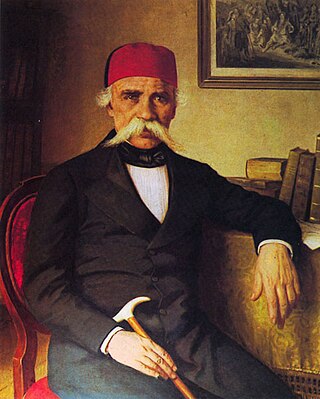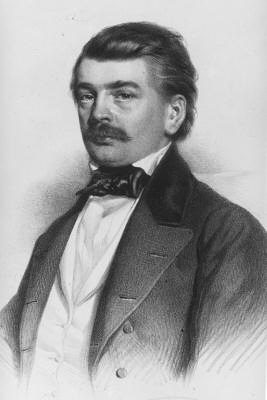| Vuk samotnjak | |
|---|---|
| Directed by | Obrad Gluščević |
| Written by | Stjepan Perović, Obrad Gluščević |
| Starring | Slavko Štimac, Ivan Štimac, Boro Ivanišević, Željko Mataija, Smiljan Čičić |
| Music by | Bojan Adamič |
| Country | SFR Yugoslavia |
| Language | Serbo-Croatian |
Vuk samotnjak ("Lone Wolf") is a Yugoslav children's film released in 1972.

Vuk Stefanović Karadžić was a Serbian philologist, anthropologist and linguist. He was one of the most important reformers of the modern Serbian language. For his collection and preservation of Serbian folktales, Encyclopædia Britannica labelled Karadžić "the father of Serbian folk-literature scholarship." He was also the author of the first Serbian dictionary in the new reformed language. In addition, he translated the New Testament into the reformed form of the Serbian spelling and language.

Serbian epic poetry is a form of epic poetry created by Serbs originating in today's Serbia, Bosnia and Herzegovina, Croatia, Montenegro and North Macedonia. The main cycles were composed by unknown Serb authors between the 14th and 19th centuries. They are largely concerned with historical events and personages. The instrument accompanying the epic poetry is the gusle.
Montenegrin is a normative variety of the Serbo-Croatian language mainly used by Montenegrins and is the official language of Montenegro. Montenegrin is based on the most widespread dialect of Serbo-Croatian, Shtokavian, more specifically on Eastern Herzegovinian, which is also the basis of Standard Croatian, Serbian, and Bosnian.

Gaj's Latin alphabet, also known as abeceda or gajica, is the form of the Latin script used for writing Serbo-Croatian and all of its standard varieties: Bosnian, Croatian, Montenegrin, and Serbian.

Vuk II Krsto Frankopan Tržački was a Croatian nobleman and soldier of the Frankopan family, father of noted poet and politician Fran Krsto Frankopan. He was born about 1588.

StjepanMitrov Ljubiša, was a Serbian and Montenegrin writer and politician. He is famous for his unique short stories, generally ranked among the masterpieces of Serbian literature in its day. These stories are also a symbol of the Serbian rebirth, both for its patriotic message and because it was a fundamental milestone in the Serbian language reform.

The Serbian Cyrillic alphabet is a variation of the Cyrillic script used to write the Serbian language, updated in 1818 by the Serbian philologist and linguist Vuk Karadžić. It is one of the two alphabets used to write modern standard Serbian, the other being Gaj's Latin alphabet.

The Serbian Guard was a Serbian paramilitary active in the Croatian War with close ties to the Serbian Renewal Movement (SPO). Eighty percent of the guard's members were members of the SPO. The paramilitary was formed by SPO official Vuk Drašković and his wife Danica Drašković, along with Đorđe Božović "Giška" and Branislav Matić "Beli".
Vuk is a male Slavic given name, predominantly recorded among Serbs as well as Croatians, Macedonians, Montenegrins, Slovenes. The name literally means "wolf". Vuk Karadžić, 19th-century Serbian philologist and ethnographer, explained the traditional, apotropaic use of the name: a woman who had lost several babies in succession would name her newborn son Vuk because it was believed that the witches, who "ate" the babies, were afraid to attack the wolves. In the Serbian epic poetry, the wolf is a symbol of fearlessness. Vuk was the 3rd most popular name for boys in Serbia in 2021.

The Vienna Literary Agreement was the result of a meeting held in March 1850, when writers from Croatia, Serbia and Carniola (Slovenia) met to discuss the extent to which their literatures could be conjoined and united to create a standardized Serbo-Croatian language.
The agreement recognized the commonality of South Slavic dialects and enumerated a basic set of grammar rules which they shared.
Željko Rohatinski was a Croatian economist who served as Governor of the Croatian National Bank from 2000 to 2012.
Vukićević is a Serbian surname, a patronymic derived from the masculine given name Vukić, itself a diminutive of VUK. It may refer to:
Vukić is a Serbo-Croatian surname, a patronymic derived from given name Vuk. It is itself a diminutive, meaning "little Vuk". It may refer to:
Vuk Kulenovic was a Bosnian composer and teacher based in Boston, Massachusetts. He taught counterpoint, orchestration and directed study at Berklee College of Music. He composed and had commissions from around the world. His influences were wide-ranging, including jazz, Indian ragas, Balkan folk music, rock and many other contemporary styles. He wrote over 100 works for symphony orchestra, solo instruments, chamber ensembles, choral and vocal pieces, ballet, and scores for film and stage music.
Obrad Gluščević was a Croatian film director. He wrote and directed around twenty documentaries, five feature films and two television series.
This is the family tree of the House of Frankopan, a Croatian noble family, from 1115 to 1671.
Vukasović is a Serbo-Croatian surname, a patronymic derived from the Slavic name Vukas, a variant of Vuk. Notable people with the surname include:

The Battle of Una was fought on 29 and 30 October 1483 between the regional Ottoman forces, mostly from the Sanjak of Bosnia, and the Kingdom of Croatia near Brod Zrinski at the Una River crossing and was one of the first major Croatian victories against the Ottoman Empire. The Croatian army was led by the Ban of Croatia Matthias Geréb and several members of the House of Frankopan, joined by other Croatian nobles and the Despot of Serbia, Vuk Grgurević. Their goal was to intercept the Ottomans that were moving towards the Una River. In the battle that lasted for 2 days the Ottomans were defeated and soon a 7-year truce was signed with Sultan Bayezid II.
Matej Vuk is a Croatian professional footballer who plays as a midfielder for Croatian First Football League club Istra 1961 and the Croatia national under-21 team.

In the immediate aftermath of World War I, the region of Međimurje was occupied by forces loyal to the National Council of the State of Slovenes, Croats and Serbs, one of the predecessor states to the Kingdom of Yugoslavia, in November and December 1918. Predominantly inhabited by Croats, this territory was a part of the Kingdom of Hungary until it was captured by Yugoslav forces. The region was annexed by Yugoslavia, which was awarded it at the Paris Peace Conference (1919–1920).